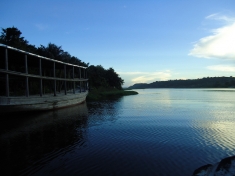Brazil Lawsuits Aim to Impede Authorization of Water Use Rights for Dam Developers
Reproduced with permission from Water Law & Policy Monitor, 2014 WLPM (Nov. 27, 2014). Copyright 2014 by The Bureau of National Affairs, Inc. (800-372-1033) <http://www.bna.com>
Federal prosecutors in six Amazon states filed lawsuits aimed at making it harder for the National Water Agency (ANA), a federal regulator, to authorize water rights for developers of infrastructure projects, mainly dams, that impact Amazon river basins.
The lawsuits ask federal courts to prohibit ANA from authorizing the water use rights until the agency complies with a 1997 law requiring it to draft river basin management plans that must be approved by basin management committees, Felí́icio Pontes, a federal prosecutor in Pará́ state who filed one of the six lawsuits, told Bloomberg BNA Nov. 21.
No such river basin management committees – made up of federal and state governments, water users, local community representatives and nongovernmental organizations – have been established for any Amazon river basin. However, they have been set up for many state rivers, especially in southern and southeastern Brazil, as well as some federal rivers—those that run through more than one state –outside the Amazon basin.
"If, as we expect, federal judges rule in favor of our lawsuits, those decisions will not allow ANA to authorize water use rights for Amazon river basins, as it has been doing, unless the agency drafts river basin management plans that basin management committees must then approve," Pontes said. "And these two prerequisites could slow the process by which dam developers get preliminary environmental licenses because developers need ANA authorizations to get such permits which are needed to initiate a project."
Three-Step Licensing Process
Environmental licensing in Brazil is a three-step process: preliminary license, based on having submitted am environmental impact assessment, followed by a construction permit and then a final license that allows operations to begin.
Pontes expects the judges to issue preliminary decisions by the end of the year that ANA would have to immediately comply with but that appeals courts can overturn.
Brent Millikan, the Brazil representative of International Rivers, an environmental and human rights group, told Bloomberg BNA Nov. 22 that judicial decisions supporting prosecutors’ lawsuits would mitigate conflicts between local communities and dam developers.
"ANA’s authorization of water use rights for large hydroelectric projects on major tributaries of the Amazon, in violation of the 1997 law, has created conflicts between dam developers and local populations, among them indigenous peoples, river bank communities, fishermen and family farmers, who depend on healthy rivers for their survival and wellbeing," Millikan told Bloomberg BNA. "According to that law, ANA may only grant such authorizations if they are compatible with river basin management plans designed to promote conservation and reconcile conflicting demands on water resources, giving priority to social needs, plans that river basin committees with popular participation must approve."
Aspect of Law Have Been Ignored
He said these aspects of Brazil’s water law have been ignored by ANA in the licensing of large Amazon dam projects.
ANA issued a Nov. 19 statement saying that "we have not yet received any court notification about the lawsuits and will only reply [to federal prosecutors] if and when the time comes, obeying judicial deadlines set by Brazilian law."
The lawsuits, if successful, wouldn’t only impact developers of large Amazon dams but, to a lesser extent, mining projects that divert water from Amazon rivers to wash and process mineral ores at mines located near those rivers, Pontes told Bloomberg BNA.
- To contact the reporter on this story: Michael Kepp in Rio de Janeiro at correspondents@bna.com
- To contact the editor responsible for this story: Gregory Henderson at ghenderson@bna.com



